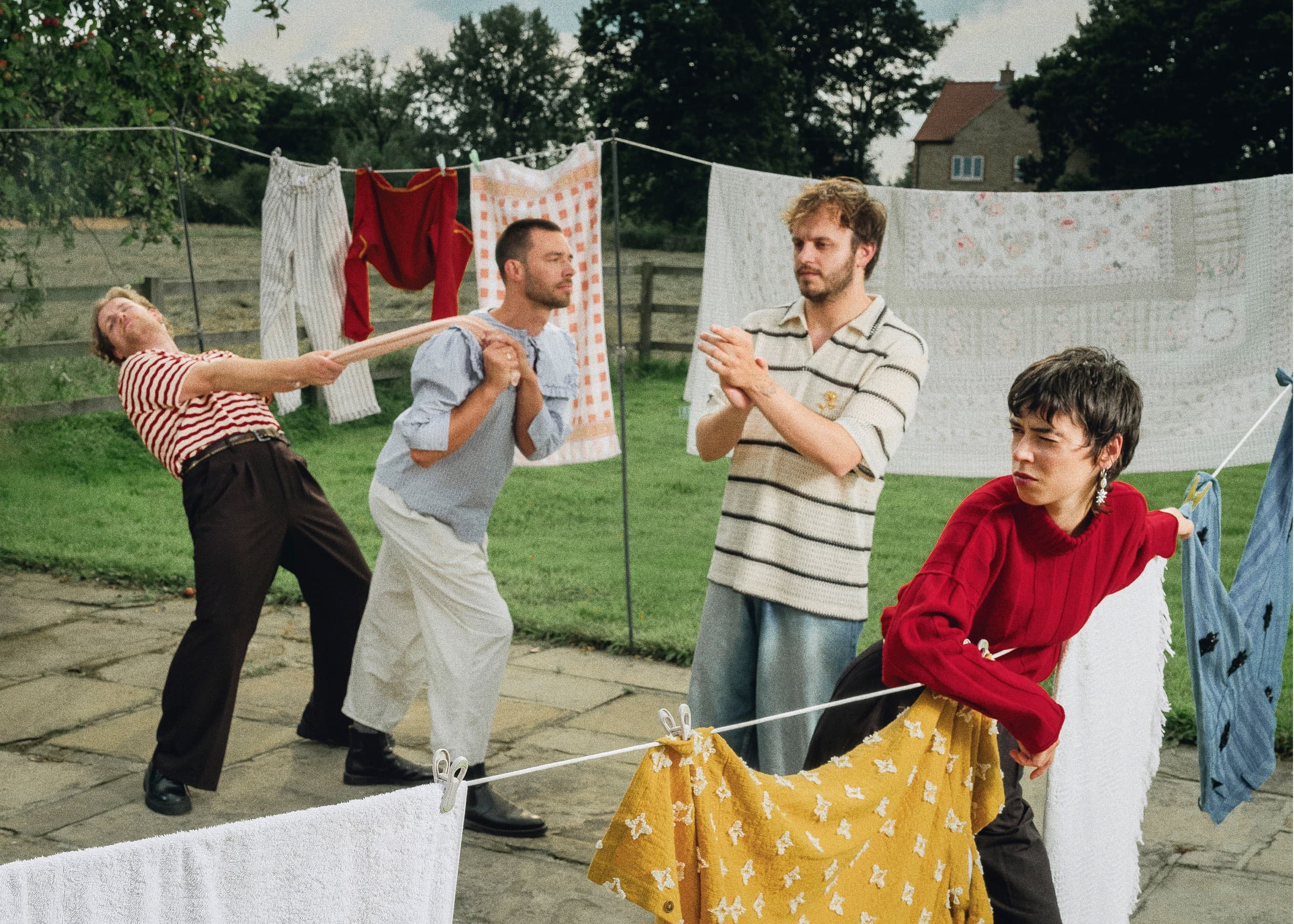Divorce is creating shelter with ‘Drive to Goldenhammer’

Divorce likens the release of their first album to “standing on a precipice completely in the nude”. It’s this melange of humour and vulnerability that forms something of a trademark for the Nottingham-born band. It’s also a throughline in Drive to Goldenhammer, which acts as a sonic exploration of the meaning of ‘home’. Recorded in the depths of winter at the picturesque Real World Studios — where the band ate together but definitely did not sleep in the same room — the album emerged from a moment of stillness and reflection in what is an otherwise “placeless” life. For the band, that’s exactly what the fictional locus of Goldenhammer represents — a tangible place to ground oneself in the midst of chaos. And, while “restlessness” is something lead guitarist Adam describes as essential for an artist, Goldenhammer is a universally needed place — and the band wants to welcome you in.
How does it feel having your debut album out in the world?
Adam: Like standing on a precipice completely in the nude — very freeing but quite daunting.
The album has a strong tie to the concept of home. Why did you create the fictional location of Goldenhammer for the album?
Felix: Goldenhammer was a fictional place-name that came from a line in the last track on the record, “Mercy”. In a way it felt like a representation of something we all pine for in some way, and something that spurs us on creatively — a need for something like home, or something to hold onto whilst in the midst of living a fairly placeless life. Ultimately, I think we found that sense of home in each other and in the process of making the record, and we will keep on finding that as long as we keep making music.
Tell us about the experience of creating the record at Real World Studios — is it true you ate together and slept in the same room in the process?
Kasper: It is true we all ate together but it is a lie that we slept in the same room. It’s a beautiful place, we felt so locked into the recording and it was the depths of winter, so hiding inside and cooking up these songs felt very natural.

Drive to Goldenhammer also brings up the themes of personal upheaval and transformation. Why did you decide to get so personal for the album?
Tiger: I think the big theme of making sense of home came from how personal the writing on this record is. Everything visually kind of came together because of that, too. That’s what me and Felix were going through while we were writing the record, so that’s how it ended up. I don’t think it was too conscious. It’s nice to write about personal experience because I suppose it’s the most honest and vulnerable you can be as a writer, and that’s what we felt we wanted to bring to our first record.
You’ve mentioned before about feeling “restless” in your lives and songs. How does that manifest in your music?
Adam: I think restlessness is important for any kind of artist. It pushes us to create and encourages us to be inquisitive. The trick is knowing when something is finished, and I think that feeling is palpable in the room. When it happens you just have to be ready to receive it.
Can you tell us about the song “Antarctica”?
Felix: The song is basically a musical retelling of an experience Tiger and I had when we encountered a newborn calf in the road, and I was also writing from the place of having just gone through a very painful breakup. There’s certainly warmth in the song — as there is across the record — and I hope it feels like a very human body of work. It does to me.
“Hangman” also has an interesting story behind it.
Felix: At the time of writing Hangman I was working as a support worker and it was simultaneously the hardest and most rewarding job I’ve ever done. I have an immense amount of respect for people who work in care and it’s a career which is rarely given the respect or support it deserves. It massively influenced the song, which is all about the strong feeling of wanting to help someone and make their life better in any way you can, even when you feel at your lowest yourself.
You also bring humour into the album. Tell us about that.
Kasper: In day to day life we’re fundamentally unserious people, so I think that just bleeds into the music on its own. Lyrically none of the album is particularly humorous, but there’s little mistakes and chatter spread across it that I think shows our personality, which is important to us. Obviously the songs stand up on their own but the extra flavour we all add is hopefully apparent.
As a band, you don’t tie yourself down to one genre. How do you think that flexibility caters to you creatively?
Tiger: It certainly stops us from saying no to something that feels right for the song. I don’t think any of us were consciously trying to create rules for ourselves about what the songs could and couldn’t have for the album. However, we naturally do flourish with a tad of limitation. So the record is a result of setting ourselves no limits, but not straying from what makes us us.
You’ve said that your album acts as shelter to yourselves, while leaving the front door open to everyone. What do you hope your listeners will take away from Drive to Goldenhammer?
Adam: Come in, duck. Take your shoes off and warm your toes by the fire.
What’s next for Divorce?
Adam: We are cooking up the most potent live show known to man. Be prepared.
- WriterScarlett Coughlan
- Image Credits Flower Up & Rosie Sco




